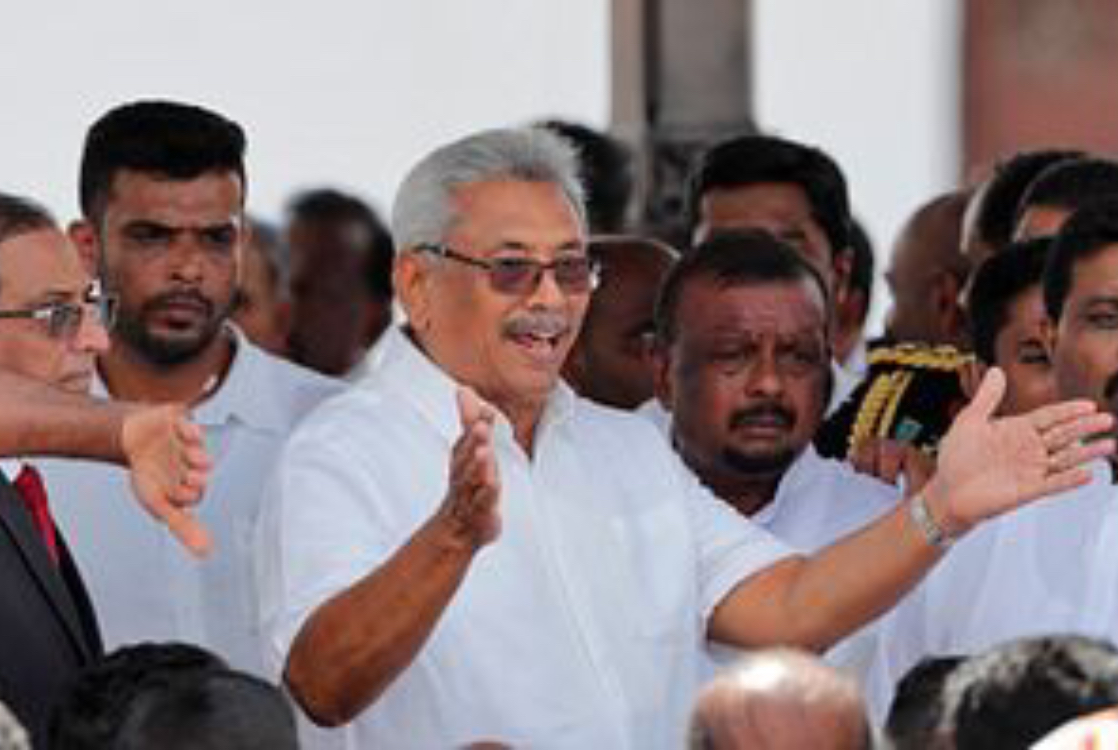The Sri Lanka Collective for Consensus (SLCC) shared a memorandum on reconciliation and peacebuilding with President GotabhayaRajapakse when they met with him and other senior government officials at the presidential secretariat on August 3.
The 11 point memorandum outlines measures that can be taken to revive the national reconciliation process and to safeguard civil society space and improve governance.
The SLCC submitted the memorandum after the President tweeted on 11 July that the Sri Lanka government is committed to work with the UN to ensure accountability and human development for lasting peace and reconciliation. In his tweet, the President also said that his government is dedicated to resolving issues within the democratic framework to ensure justice and reconciliation by implementing necessary institutional reform.
The SLCC is a collective of academic, religious and non-governmental organisations. The government officials who were present at the meeting were Minister of Foreign Affairs, Dinesh Gunawardena, President’s Secretary DrP B Jayasundara and Foreign Secretary, Admiral Professor Jayanath Colombage
MEMORANDUM TO HIS EXCELLENCY PRESIDENT GOTABAYA RAJAPAKSA ON REVIVING THE NATIONAL RECONCILIATION PROCESS, SAFEGUARD CIVIL SOCIETY SPACE AND IMPROVE GOVERNANCE
“We are committed to work with the @UN to ensure accountability & human dev. to achieve lasting peace & reconciliation. We are dedicated to resolving the issues within the democratic & legal frame to ensure justice & reconciliation by implementing necessary institutional reforms.”
-Tweet by President Gotabaya Rajapaksa July 21, 2021
In keeping with the above presidential policy directive, we the undersigned members of the Sri Lankan Collective for Consensus call on the government to implement the below mentioned measures expeditiously. We believe there is a need to bring together all political parties so that national policies, including on reconciliation, will be framed which will be implemented by successor governments. We also believe in the value of including civil society in policymaking discussions.
Reconciliation-related measures:
1. Repeal or amend the Prevention of Terrorism Act toensure that any legislation on combating terrorism complies fully with the State’s international human rights and humanitarian law obligations. In the meantime, stop all arrests and detentions under this law.Put those detained under the PTA on trial speedily or release them on bail or discharge them entirely. Eg LTTE detainees, post- Easter attack detainees and all others under the PTA.
2. Conduct provincial council elections immediately.Elected Tamil representatives who are currently marginalized in terms of power at the central government level, will be empowered at the provincial level to be decision makers.
3. Ensure an environment in which the Office on Missing Persons and the Office for Reparations can operate effectively and independently. Provide both Offices with sufficient resources and technical means to effectively fulfil their mandate. Ensure appointments are appropriate to the mission of each of the institutions.
4. Ensure the investigation and, if warranted, prosecution of long standing emblematic cases involving alleged crimes relating to human rights violations and serious violations of international humanitarian law. Establish a truth and reconciliation commission to give a definitive account of the war, and end the speculations and divisive interpretations. The possibility of granting amnesty as in the South African TRC and in the proposed British TRC for Northern Ireland can be explored.
5. Permit the memorialization of those who died in the war without blocking them. Places of religious worship can be built in areas of battles or where large scale loss of life occurred.
6. Reconstitute the Task Force on Historical Monuments in the Eastern Province, to include a fair representation of religious and ethnic minorities and to ensure that decisions taken do not violate the rights of people resident in those areas. Ensure that land settlement policy and take-over of traditional grazing lands does not become an excuse to re-engineer the demographics in those areas.
Civil Society-related measures:
7. Protect civil society actors, including human rights defenders, ensure a safe and enabling environment in which civil society can operate free from hindrance, surveillance, insecurity and threat of reprisals.
8. Place the National NGO Secretariat and NGOs under a civilian ministry. Currently they have been placed under the Defence Ministry which can create an erroneous impression that the government considers CSOs to be a national security threat and not a useful partner for social development and relief and humanitarian services which should receive high priority particularly during the pandemic.
Governance-related measures:
9. Repeal the 20th Amendment and replace it with a new constitutional provision that strengthens the independence of state institutions. This will include a Constitutional Council which includes members of civil society. In particular the judiciary, the police, the public service, the Bribery and Corruption commission and the Human Rights Commission need to be strengthened.
10. All elections will be on a mixed member proportional system. To ensure that there will be a minimum of 1/3 representation for women from constituencies and there will be a closed (appointed) national list where every other candidate will be a woman.
11. The Provincial Council system will be strengthened.Non-executive Governors will be appointed by the Constitutional Council. The Governors will assent to Provincial Council legislation. Taxes and revenues shall be shared between the Central Government and Provincial Councils on a rational and just basis that make the regions more attractive for investment and provincial development.
Resolving these root causes requires bold leadership, dialogue with the representatives of the ethnic and religious minorities and their political parties and the involvement of all sections of society inclusive of the opposition political parties and civil society.
Signed by:
Ven. Kalupahana PiyaratanaProf. T. Jayasingam
Rev. Bishop Asiri PereraProf. Tudor Silva
Rev. Fr. C.G. JeyakumarMr. Hilmy Ahamed
Mr. Rohana Hettiarachchi Mr. Varnakulasingham Kamaladhas
Dr. Joe WilliamMr. SanjeewaWimalagunarathna
Dr.Dayani PanagodaMs. VisakaDharmadasa
Dr. Jehan Perera
The Sri Lankan Collective for Consensus is a group of individuals drawn from multiple sectors of society, religion, academia, and non-governmental organisations. They are committed to a Sri Lanka that is founded on ideals of pluralistic coexistence, human rights and justice.





